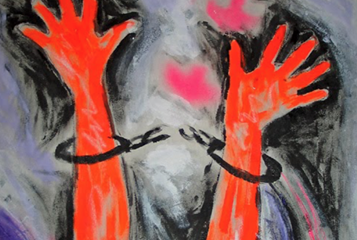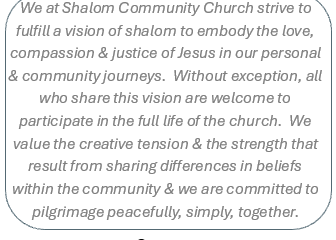Baptism
The practice of adult baptism grounds the entire theological endeavor. Adult baptism is voluntary, inclusive, and abundant. It begins faith, responds to God affirmatively, encourages repentance, and creates both a new community and a new world.
An important part of my story has been working out the meaning of my baptism. In early high school, the practice at my home congregation in Hespeler, was to switch for a year away from a regular Sunday School curriculum and engage in a year of preparation for baptism. I began the year with my classmates, but soon I knew that I wouldn’t be getting baptized that year. I did not know a lot, but at that point I did know that this non-voluntary switch to baptism preparation was not perfectly in alignment with what it should mean to be Mennonite. I chafed at that and at my own immaturity and dissented. I graduated high school and went to college. It was a good experience to be around many people my own age, some of whom had deep faith commitments which were unlike anything at my home congregation. I had not matured much, but this new context–and an important conversation with my mother in which she reminded me that I would need to take responsibility for my own faith and that I was making a decision about that whether I chose to be baptized or not–pushed me to request baptism at my home congregation. Thus began a bespoke process which culminated in my baptism. I learned much more about what baptism meant as I transferred from urban planning to religion and switched colleges. Direct study is easier for me than personal development and a set of foundational beliefs, which rarely contrasted significantly with my faith to that point, began to cement themselves. I learned much more about the meaning of my baptism a couple of years later when I had the privilege of officiating at the baptism of my college roommate, my sibling, and one of the youth in the church that we all attended in Winnipeg. Graduate school again deepened my understanding of my baptism, particularly in that my ideas now needed to be worked out in a context in which I was the only Anabaptist. At Chicago Community Mennonite Church I lead a series of Sunday School lessons on the history of catechesis in Christianity, and proposed a model for our church that would begin with a common coming of age celebration for youth as they entered high school and then a three year catecumenate in which they would encourage to take responsibility for their faith, and which if they would choose culminate in baptism. Teaching these ideas as a professor at Bluffton University from 2004-2014 further deepened my understanding. In 2016, I lost work which was tragic in many ways, but which also granted me a shift in perspective which has altered my understanding in ways that I am mostly just beginning to comprehend. Like other tragedies its meaning is difficult to fathom but sometime after 2016 I began to explore a set of ideas connected to baptism partly inspired by the twitter feeds of Melissa Florer-Bixler and Isaac Villegas. I started to give voice, at least in my head, to the idea that baptism is the centre of Mennonite life and thought and in that perspective the practice of baptism grounds the entirety of the Christian faith.
I want to talk a bit about some of these ideas this morning.
Ideally I’d talk about how I understand identity and baptism, how baptism reshapes our faith, and how baptism undergirds our central Anabaptist beliefs, but the version of this sermon that does that is longer than you want to listen to, so I’ll focus on identity and conclude by mentioning some of the other things, and maybe I’ll continue a series on baptism later this fall. I could have cut the personal story that I started with but there is an important lesson in that story.
Even though we baptize adults, the meaning of baptism still grows over time. Baptism is a one time thing but it has the kind of significance that means we continue to grow into it throughout our lives. It’s a little like marriage in this respect. It’s also a little like ordination, and this latter analogy will be meaningful to us over the next period of time as we install Jody as pastor on September 11, look to her licensing sometime this fall, and her ordination sometime in the next couple of years. An ordination will be a new ritual for us here at Shalom, and like baptism it will be based both for us and for Jo in much that we already know, but it will also give us new space to grow into.
So, the practice of adult baptism grounds the entire theological endeavor. Adult baptism is voluntary, inclusive, and abundant. It begins faith, responds to God affirmatively, encourages repentance, and creates both a new community and a new world.
Baptism is often thought to involve a transition from an old humanity to a new humanity. There is an element of replacement here. The human dies to their old self and takes on a new self. The ease with which we may shift from human to self in discussing this idea shows that this replacement happens in regard to our spiritual selves. We don’t actually believe that a new corporeal self is created at baptism through some kind of celestial transubstantiation. The implications of this replacement are real enough though and it is one of the reasons that the church sometimes has a perception of itself as a post-racial, post-class panacea. (The same logic could have been used to create a post-gender, post-sexuality church but this has rarely happened). Put more simply, traditionally Mennonites, but also other Christians, believe that in baptism we die to our old selves and become new selves. This new self has often been articulated as not being concerned with race, or class. The practice is that this new self is often caught up in a lot of patriarchal white assumptions about what it means to be Christian.
Insights about the importance of our bodies for our faith and the blessings of difference in race, sexuality, and gender offer us a new way of thinking about baptism. The abundant bestowing of a new self in baptism is still important but I want to propose that baptism does not erase any of our prior human identity, nor need it be a barrier to a further refining of our identity as we mature. The new humanity that we have in Christ through baptism includes who we already are in all of the blessings of our chosen human identity. Baptism is largely affirmative in this view; affirmative of who we are as humans, affirmative of our ability to choose what we want, affirmative of the community that we create together. But perhaps most importantly baptism responds to God affirmatively. In baptism we name who we are and respond affirmatively to God that this is good.
So we don’t die to our race or ethnicity, to who we are sexually or how we name our gender. So the answer to the question about whether or not there is Jew or Greek, Black or White, Male or Female in Christ is an emphatic Yes. There are Jews, Greeks, and many others, people of many races and ethnicities, and sexualities and genders. None of these should be privileged in the church, none should be a barrier to commitment in the church.
We do die to some things in baptism, and the community that baptism creates should name these idols as things we have died to; they should not have a place in our worship.
We die to greed. We should set ourselves and our community against the unrelenting building up of wealth, and against the use of our money to exploit and oppress other people.
Our reparative act, which I talked to Joe Gascho’s sister’s church, Community Mennonite Church of Lancaster Pennsylvania already this morning, is a good example of this. In our reparative we sought to die to greed in that we were willing to give up control of some of our money. The act was a first step in an anti-racist commitment we might have as a church, but it was also a realization of our baptismal commitment to be about sharing as a community more than we are about greed
We die to nationalism. We should set ourselves and our community against the unrelenting building up of the nation state in all it’s guises, and against the use of our political agency to exploit and oppress other people.
Our support of the Friends of Restorative Justice of Washtenaw County is a good example of this. Restorative Justice insists that the state apparatus of punish people, mostly black and brown and poor, is not adequate to address wrongs that have been committed. Instead we should be committed to a world where victims can expect restoration and harm doers.
Notice here that the proof of the commitment that is created in baptism is a particular orientation of a community. Baptism is an individual act, but it is the act of joining a community, and that community shares the characteristics of baptism which grounds the entire theological endeavor. Adult baptism is voluntary, inclusive, and abundant. It begins faith, responds to God affirmatively, encourages repentance, and creates both a new community and a new world.
As a community we choose to be here. Nothing about who we are as a community is required, but because we choose to be here our community is stronger and we can expect more of each other. Most notably here we can expect that in this space we are around people who are against the use of violence. Our society is guaranteed by the threat of violence but we know that our community is not. This is expressed in the Anabaptist idea of pacifism.
As a community we seek to be inclusive. This happens for us most decisively when we sing a song letting John Powell take the lead. It’s likely the case that the most important song to us is the blessing song. Let’s sing it now.
I don’t think I’ve ever heard a whiter rendition of that song than the one we do here at Shalom. But we also do a very capable job of backing up John who brings a different tradition to singing. We make both of these songs, and many others, as our own. This is expressed in the Anabaptist idea of community. In fact this commitment to inclusivity means that not everyone needs to be baptized in order for the community to be created.
Finally as a community we live into God’s abundance. Mutual Aid, like our Mustard Seed fund shows this. We have declared ourselves to be a place where we will take care of each other and so anyone who would benefit from some extra cash can ask for it and we’ll make it happen. We don’t have tens of thousands of dollars in that fund, but we usually do a good job of meeting special calls for money, even when we don’t plan for it. This abundance is opposed to greed but also grounds our Anabaptist idea of simple living. Living simply is a testament to the abundant world we believe in we were don’t need to seek to control our own security but can rely on others.
There are many other things I could say but I’ll stop here for now. The practice of adult baptism grounds the entire theological endeavor. Adult baptism is voluntary, inclusive, and abundant. It begins faith, responds to God affirmatively, encourages repentance, and creates both a new community and a new world.


